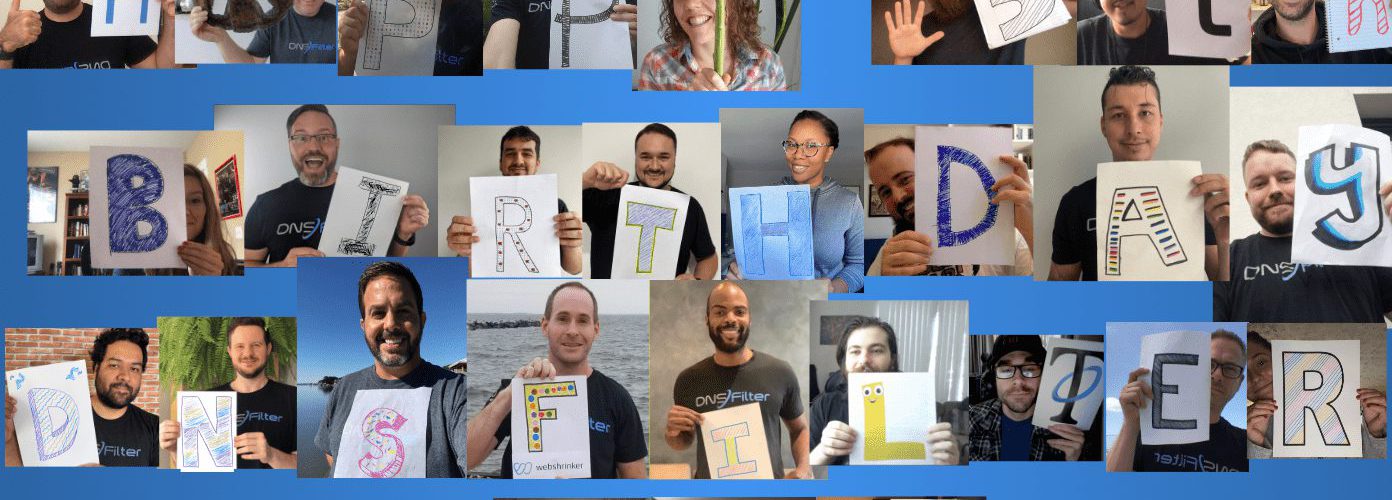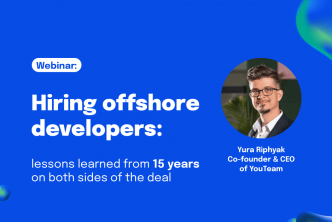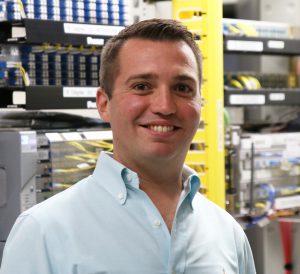
Ken Carnesi, Mike Schroll, and Brian Gillis started DNSFilter after Ken struggled to find a content filtering solution that fit the needs of his business. Rather than settle for a solution that wasn’t ideal, they created their own. DNSFilter provides user-friendly DNS security to protect entire organizations from online security threats and undesirable content. Their software is backed by powerful artificial intelligence and an industry-leading global anycast network for fast DNS resolution and real-time detection.
In the interview with YouTeam’s co-CEO Yurij Riphyak, Ken Carnesi, CEO of DNSFilter, tells about the journey of their remote team, opens insights about remote company culture maintenance, shares tips on hiring remotely, and addresses to the main pains of distributed teams.
Yurij Riphyak: To start, can you tell me about the beginnings of your company? And how did you arrive at the idea of operating remotely?
Ken Carnesi: Sure. So basically, DNSFilter essentially protects employees on the Internet from going to sites that may be inappropriate or malicious, whether that be content-wise for adult content or social media, or our primary focus area, which is phishing attacks or anything that’s going to affect your device or cause trouble.
Speaking about where it got started, back in 2007, I founded a wireless ISP while I was in school in Boston. I grew that company, and it got to the point where we had to start doing more and more governmental projects like naval hospitals, military bases, and things like that. And as we deployed these large-scale Wi-Fi networks, particularly for the government, we had this requirement to have content filtering to keep people from going to those inappropriate sites. I had started out using a product called OpenDNS, and I really loved it. But then, one day, they just began raising the prices to the point where it would make a lot of my contracts with the government unprofitable because we were giving them a really good deal. So I couldn’t stick with OpenDNS, and I soon left them as a customer.
I searched for other solutions but I actually thought that OpenDNS did a great job and there wasn’t anybody out there that I thought made a better product. This is where the idea started floating around in my head that maybe I should try making my own product as a replacement. Then one day, I think it was in the summer of 2015, I saw an article that OpenDNS was sold to Cisco for $500 or $600 million. And I was like, wow, that’s a way bigger opportunity than I thought there was, and there’s probably going to be a lot of other customers that are sort of left behind like I was or unhappy because of the acquisition. There’s this opinion that when companies get acquired by Cisco, that’s where the products go to die. So that was the kick in the pants to get it done.
At that time, I had been mentoring at a tech incubator in South Carolina, which is where I ended up acquiring another wireless ISP. I also met my co-founder who was at that tech incubator, too, and we started exploring the idea together. He had been a white-hat hacker doing pen testing for Fortune 100 companies and also had started a hosting company that he exited before we met. He already knew a lot about the infrastructure. I used funds from my wireless ISP to pre-purchase several years of service from DNSFilter and build out the MVP. Then, we did the alpha testing on about 150 of my networks, and after that, we started bringing in other people from the ISP industry who operated similar companies and got them to try it out, and sort of took it from there. That’s how it got started.
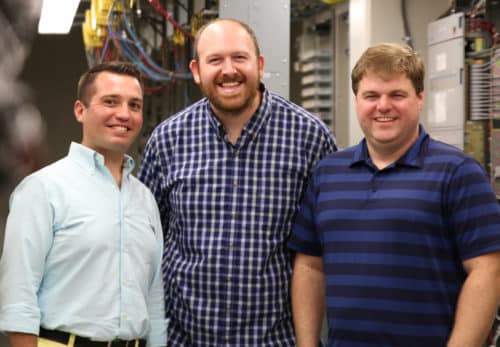
Speaking about why we got started to be remote in the first place, it wasn’t something that we actually set out to do. It was more of a necessity for us for two reasons. So, number one was that we ended up bringing on a third co-founder, who lived in New York, and we lived in South Carolina. Our third co-founder was our first sort of remote employee. The other problem was that we had limited funds, and we hadn’t yet gone through a round of funding. At that time, this was still a side job for us, and we weren’t going to move to the same location for a company that didn’t have funding yet.
Plus, to compound the problem, being in Myrtle Beach, South Carolina, we didn’t have access to the talent pool, especially in the technology space that we needed. We had no option but to look elsewhere. I think our first hire was from the Czech Republic. It was somebody who used to work at OpenDNS as a support person. Then, our second hire was from Colombia. And now we’re up to about 30 people. We’ll be close to 40 people by about the end of September, with plans to go well beyond that in the next six months. So our employees are all over the place — South America, the US, and Europe.
Yurij Riphyak: Are all your employees working from home, or do you have some of them co-located in certain places?
Ken Carnesi: That’s a good question. Technically, we have two offices. One is in DC, but that’s really just me and a few others. The largest office we have is in Denver, Colorado, where our sales team is. It’s a small team at the moment, but that’s the one exception that we might actually try to keep from being remote.
I guess the feeling that I learned early on was a couple of years ago when we surpassed the 1 million a year in revenue mark. And that was a big deal for us back then. I came into the office at 10 o’clock in the morning with a bottle of champagne, and I’m like, “Alright! We’re gonna pop this bottle and kill it and celebrate!” And it was super sad, you know, there was just me and one other person drinking in a small room at 10:30 in the morning with some other people in Zoom completely not on the same page.
I realized that salespeople, though, are competitive, and they like to celebrate. They have the camaraderie, and they cheer up and help each other. So we’re trying to keep the sales part of the organization in one place.
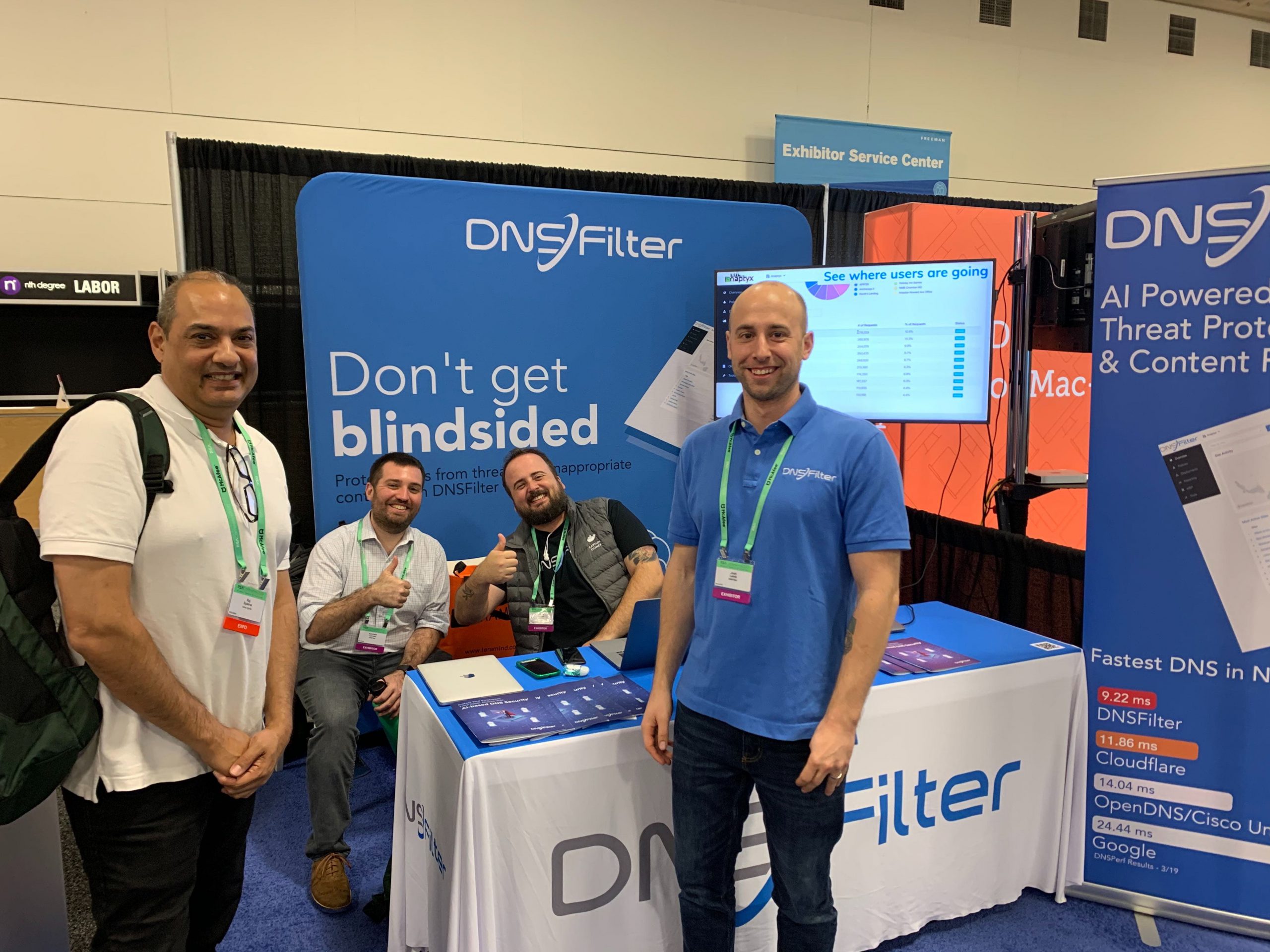
Yurij Riphyak: I’ve just been to Denver. It’s a lovely place. I think more and more companies should think about moving to a location like that, especially now there is this massive exodus from California because of the prices and taxes.
Moving back to DNSFilter, let’s talk a little bit about hiring remote employees. What is your usual process? Do you rely on external recruiters or source people yourself? Do you use any online tools for that? Because for many companies, it feels like a challenge to hire remotely without actually meeting a person.
Ken Carnesi: Actually, it’s now come to the point where I think it’s the opposite for us. For example, it was harder to find the office manager because they had to be in DC, and this was sort of a limitation for us. But how we do hiring really depends on the position. The only positions we ever tried with an external recruiter were sales positions, and it worked out one time out of four. The best thing for us has been to find them on our own. If they do have experience in sales for even less than a year, it doesn’t matter. What they were selling is also not as important as the spirit we’re looking for and a good culture fit and drive. I mean we have people like our sales manager who used to work at Zillow, which is completely different compared to what we do. So, yeah, their past experience doesn’t really matter as long as they’re a great fit and performing well.
When it comes to tech positions, though, that is a little different. I think we’ve done a really good job in hiring good people in the tech field, whether they were developers or DevOps people. The key to success for us turned out to be going to industry-specific locations — a DevOps or developer forum or Slack channel or something like that. We’re not finding them on Indeed or Monster.com, it’s always going to be some underground type of network.
If it’s the support people, we’ve had positive experiences going to places like Reddit. Even Reddit can be a good source because they have forums and subreddits for various industries. For example, we sell to MSPs, managed service providers, and their outsourced IT companies are generally our customers. So when we need a support person, we go to the Reddit channel for people who worked at MSPs and are leaving or lost their job or looking for a new job. They understand who our customer is, and that’s been a good practice to find the right people so far.
We also try to incentivize the employees to recruit for us as well. While we’re getting to the point where we probably will have an in-house recruiter soon, we’d still rather give a few thousand dollars to an employee if they can bring us somebody who they can vouch for. Somebody they already know is a good culture fit. For a 30 person company, we’ve probably brought in around 25% from referrals.
And to be honest, we’ve never lost anybody. We had to let people go for a performance issue or something like that, but we’ve never had any issues with the people who were brought on through referrals from employees who were already doing well here. So that’s been a good one.
Speaking of tools, though, we rely the most on a tool called Breezy. We also tried a couple of remote work platforms and some of those have worked out occasionally, but Breezy is the main tool that we use to bring everything together.
One of the things we’ve learned through the hiring process is that it is better to hire people who have had experience working remotely somewhere else before. Whenever people have not worked out, it’s been generally one of two things. It’s either been that they have not worked somewhere remotely before, and some people are just not capable of it for reasons that we could probably get into.
Yurij Riphyak: Like autonomy, right?
Ken Carnesi: I personally think it’s a discipline thing. You need to be inherently driven if you want to thrive. I think anybody can probably work remotely and just get by. But in a startup environment, if you want to thrive and do well and grow within the company, you definitely have to be more driven if you’re going to try to do that remotely. And discipline is important in the sense of communication.
Communicating effectively and clearly, being responsive, and setting expectations for when you’re not going to respond is crucial. You need to treat being present on Slack as if it’s the equivalent of being present in the office. It’s cool if you need to go for a walk or go get lunch, that’s fine, but you should tell your coworkers you’re away or if you need time for focused work. Don’t just pause your notifications, tell us where you’re at and what you’re doing, so that we can all communicate effectively. It’s the equivalent of if you’re in an office and you shut the door. I know that it means that probably you don’t want me to come in, but we’re not in an office, and I don’t know that you’re not wanting me to talk to you.
We’ve had some people who were working in person before the pandemic. They hadn’t had any experience working remotely before. We had initially hired them for in-person roles, then the pandemic happened, they had to shift to working remotely and just didn’t have what it takes. It’s unfortunate, but that’s what it is.
As far as the recruiting process goes, I think if you’re doing your posts right — making it something that people are excited about, a place that people are excited to work at, you’re going to get more responses than a typical in-person job restricted to a geographic area. I think it’s important to not over-automate the process.
For example, Breezy has options where you could send pre-screen questions to a candidate. That didn’t work out with us. We were getting probably a 75% reduction in responses when we did pre-screening that way. We’re definitely focused on trying to skim through the people and send manual emails. I think that’s where many companies make this mistake a lot: they think it’s so hard to go through all these applicants, and they find some automated way to do it. But the applicants on the other side say “I’m not gonna make this stupid video response that nobody’s ever going to watch.” So personal responses and attention through the recruitment process are what have helped us tremendously.
Yurij Riphyak: Right, this is always a mutual process. Have you ever used any freelance portals as a primary source, or any dev shops contractors or firms like that?
Ken Carnesi: Not really. I could see how it kind of dovetails on another topic entirely. I’ll just say it’s very important to have at least one technical co-founder who knows what you’re doing. If you have that, you’re at a massive advantage to the majority of the startups out there. I’m technical, and all our other co-founders are technical too, so we personally have stayed away from dev shops because we know how the sausage is made, I guess. So if you can avoid dev shops, I would suggest doing that.
I think that if you’re going to go that route, the Upwork is probably a better option than to go to an actual shop. And then, on Upwork, I always try to stay with individuals as well. There have been three or four employees that we found on Upwork.
We’re about 30 full-time employees but we have part-time people too. Still, it’s rare in the tech industry to find somebody who truly knows what they’re doing, and who is honest and does the work that you’ve asked and on time. However, we did find some great specialists, and they’ve actually stopped their job on Upwork, which was their primary source of income, and now they work at DNSFilter.
Yurij Riphyak: Okay, let’s talk a little bit about the culture. You mentioned a situation of how you were celebrating your first million ARR milestone, and how lonely it felt. And that those people who have contributed to this success, they’re not actually in the same room. And yet, you would be surprised, but this is probably the number one issue that most remote companies report. Hiring is actually not such a big problem, and the actual work management is not such a big deal. But to keep this human connection, this dimension between people. And unlike the office, where lots of things are happening organically, and there is a lot of spontaneous communication, in remote settings, every employee is effectively reduced to their function. So this communication and human bonds just don’t happen automatically in a remote company, you have to deliberate proactive efforts to compensate for that. So, does this problem manifest in the DNSFilter team, and how do you address this?
Ken Carnesi: Yeah, there are a few ways. I’ve been working with a group called Reboot.io. It has been pretty helpful. They offer business coaches, leadership development, and they’re pretty well known in the Techstars community. We’re using them for leadership courses, and I use them as a business coach right now. So some things we got from them and some ideas are internal.
On a more micro basis, some of the really simple things we do, that still make a big impact, are all-hands meetings every two weeks. It’s about a one-hour meeting and we keep 30 minutes of it dedicated to actual company updates. The company is divided into teams, one team is responsible for ops and marketing and revenue, one team for development, one team for infrastructure and support, and each team’s leader gives an about 10-minutes update on the things that have happened in the last few weeks, and what’s coming up in the next two weeks. We also announce who is going to be out on vacation or anything planned in the next two or three weeks, so everybody’s definitely aware of that.
And then we spend the second half doing what we call Red-Yellow-Green check-ins where we break into Zoom rooms, three or four people per room. I also make sure that people aren’t talking to the same people week after week and try to encourage people who have never really talked to each other to start a conversation together.
What they do is they go around and share their work or personal feelings through color. Red means bad, green is good, and you can do any color combination to express yourself. It encourages people to say how they’re feeling, or share something they don’t have to share but they may want to, like my daughter’s sick or the new baby is staying up all night, or whatever. The other employees in the group either just listen, or they provide support or solutions or empathy or something. But basically, it makes people, who otherwise don’t talk, share their feelings, and put an actual human connection to that person existing and being a person and not just a username, on the screen. So the next time a developer needs help from support people or vice versa, they’re going to know that it’s not just an employee Jordan, that’s Jordan who had a fever last week. So that’s one thing.
The other thing we do is an optional company happy hour over Zoom every two weeks. For some people, it’s after work, for others it’s during work, but we all just get around and have a drink or two for an hour or hour and a half. Sometimes those things go on for three hours because people enjoy it so much, and it’s not the whole company, it’s usually about 10 to 15 people. That’s been tremendously effective team building.
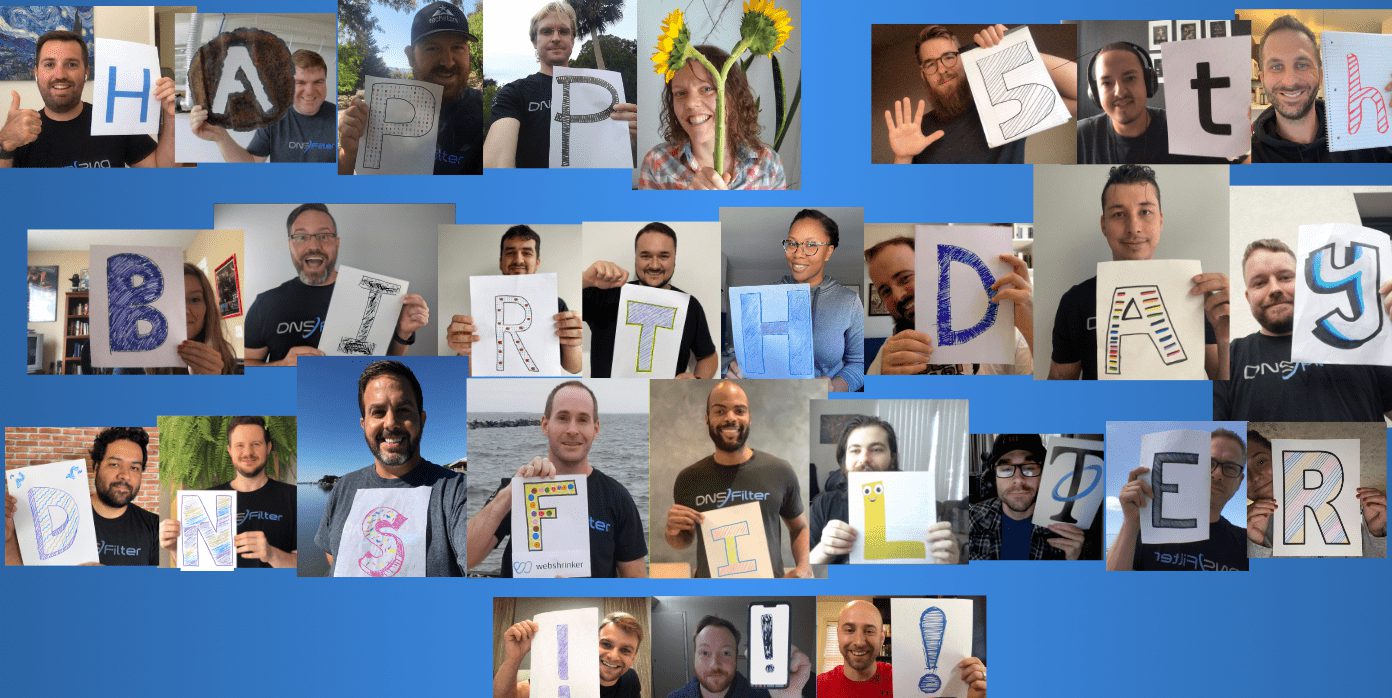
The other micro thing that I didn’t think would make a difference is starting Slack channels for various things. This probably particularly makes sense during the pandemic but it all started as a TV and movie channel, and people would just post like oh I watched this movie, eight out of 10 recommended or something.
Yurij Riphyak: We have the same thing for music.
Ken Carnesi: Yeah, we now have a book channel. We have a music channel. We have one dedicated to Miller Lite beer now. People are sharing what they’re drinking, what they’re reading, what they’re watching, what they’re listening to. We even have one channel for gamers. A couple of employees have teamed up and played video games with each other, so it’s kind of interesting. That’s the micro stuff.
The larger thing that we try to do, which we haven’t been able to do with the pandemic, is company meetups. It is now a challenge, given the fact that we’re not just remote but also international, people need visas. Not everybody can just come to the US whenever they want. When we’re building projections, meetups are just part of the expenses, you know, $500 a month for every employee goes towards a company meetup twice a year. We usually pick a location that’s gonna work well for visas. It also should be unique to most of the people so that they’re excited to go and see something new. These meetups usually last for a week or so.
The last time we got to do that before the pandemic, we went all to Cartagena, Colombia. We all hung out on a beach. We rented a yacht for the day. We had a good time and got a lot of work done too. It’s also good culturally because two of the employees live in Colombia, but not that part of Colombia we went to. So they got to see something new and have fun, but they also got to share their culture with us and kind of host us there and take us around. That was great! So, people look forward to this as a perk, and six months or so seems to be the perfect amount of time that people are maintaining after that last trip to start looking for a new journey.
Ken Carnesi: Yeah, and I think it’s great on many levels. It’s good stories and good times.
Yurij Riphyak: Do you use any tools for the extra, spontaneous communication like a Tandem chat or some games via Zoom?
Ken Carnesi: We haven’t yet looked into it, but we’ll probably try some out. One that seems really interesting is called Donut. I’d be willing to give it a shot. I think we accomplished some of it, to a degree, with our regular green check-ins. I also think it’s tough. I mean, it depends on how big the company is. I feel like when we got to 20 to 25, that’s when we realized that you really have to start putting the work in on building the culture and getting the team working together. I spent almost no time on that when we were 10 or 15 people. It just gets exponentially more difficult and time-consuming, but it’s still super rewarding to spend time on it in every way.
Yurij Riphyak: But, in general, does it feel like a problem? Do you think that you want to do more against this lack of spontaneous culture building? Or do you feel like what you’re doing is more or less enough to address the issue?
Ken Carnesi: No, I’d like to do a little more. It’s a good question because there’s an interesting thing that I’ve noticed with the happy hour that I mentioned, is that it is optional. I can’t force people to come and drink. But the fact that it is optional, I guess, is also what makes it fun, because the people who are there want to be there. And we’re enjoying it. But then people who don’t show up are very quiet and not really wanting to provide feedback. So I think we do need to do more work to try to get those people to engage in some way.
And I guess the ultimate goal is to build a better company by having those personal relationships and making people feel comfortable because we are getting feedback and we can improve. I don’t want to be the guy who’s forcing everybody to be there like we are all a big family or something. That’s fine if they don’t want to be a family. But I do want them, at least at work, to feel like their opinion matters, and that we value their feedback. So from that perspective, yes, I would like to try to improve that.
Yurij Riphyak: Yeah, exactly, it is important to address those more introverted teammates because what they have to say can be super valuable. It’s like they need to be invited to say something. For example, we had different ways to moderate the meetings. One is when everyone gets a time slot and an opportunity to speak. The other one is when we just have an open discussion. And it looks like those people who are the introverted types, they enjoy the first type of meeting more because for them this system makes sense, and they contribute at the same level as everyone. But when you have this discussion, they feel uncomfortable. So I guess you just need to look for an appropriate way which would reflect the different personalities in your team. And you want a diverse team, right? You don’t want a team of salespeople only.
Ken Carnesi: Absolutely.
Yurij Riphyak: Now is my last question, the one that I ask at every interview. We are all makers. We like to build stuff and get our hands dirty. I’m sure you had those moments when you reflected on your working process and how this remote setting performs. And you thought that if you had more time, you would probably build a solution to a particular problem. So is there something annoying right there? Can you remember any of those ideas?
Ken Carnesi: I can name a few. The first thing that comes to mind is time management — time off, holidays, vacation, sick days. To be honest, I’ve been shocked by how bad the options are for running a remote, international team — one that exists outside of a single country. We use Justworks, and it’s amazing for people inside the United States. But for those outside with different holiday schedules, it’s a big challenge. HR for international remote teams is, in general, just terrible.
I’d say that’s where most of my suggestions go to — time management and paying the people. Some employees you need to pay through Veem and others require Transferwise. That’s a real mess, and none of these actually integrate with any HR system that I’m aware of. As a result, international people get treated differently since they’re on a spreadsheet basically. Benefits are a challenge for remote workers too. Each country is different, and there’s no one provider that I’m aware of that can handle that.
Another very big problem is gifting and swag stuff. For example, we’re about to hit a really big revenue milestone in the next five-six days. I wanted to send a bottle of champagne or something like that to everybody. As you can see there’s a pattern here. And there’s no way and no service where I can treat everybody equally. I want the people outside the US to feel like equal citizens to the people who work here. Often, that means that I either have to go through a massive amount of work to get them equal treatment, or just everybody gets nothing. It’s frustrating.
Yurij Riphyak: Yeah, all those solutions are not designed for international case scenarios.
Ken Carnesi: There’s one more thing. Sending laptops and stuff is insane, especially when you get into South America. Taxes there are crazy. One thing they don’t tell you is when a laptop originates in the US, and you ship it to an overseas employee, and then the laptop breaks, unless you pay extra for Apple care on every single laptop, Apple does not honor the machine to get repaired outside of the country of origin. So the guys in Brazil, whom we shipped something to, are screwed. We have to either pay $400 for Apple care each time or, we have to pay to get the laptop in Brazil, which is way more expensive there. So getting things to people is a challenge.
Yurij Riphyak: Cool! That’s all from me. It’s been super insightful and interesting to hear how you guys manage all those challenges associated with remote work. Thank you for this inspiring interview!

